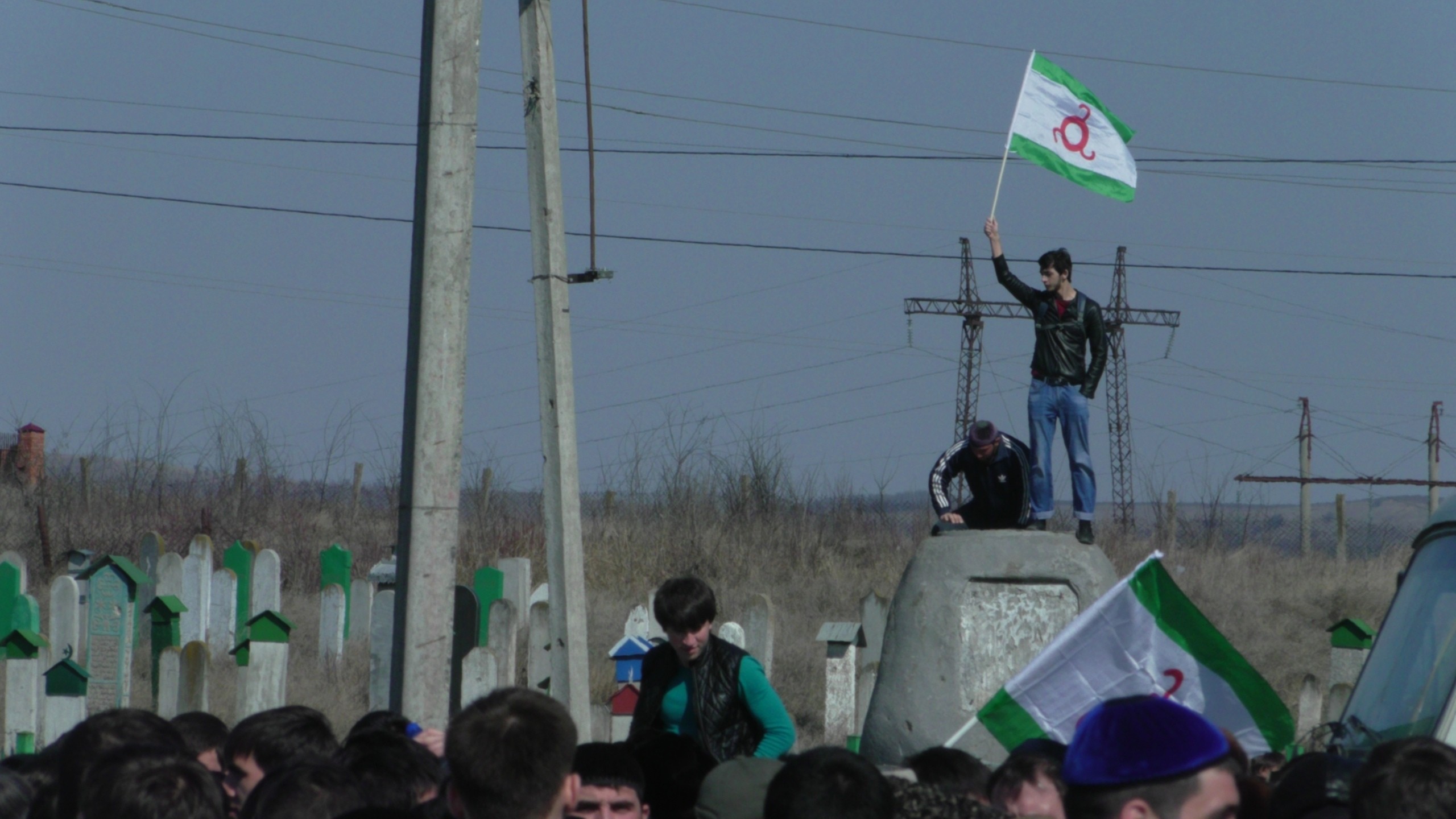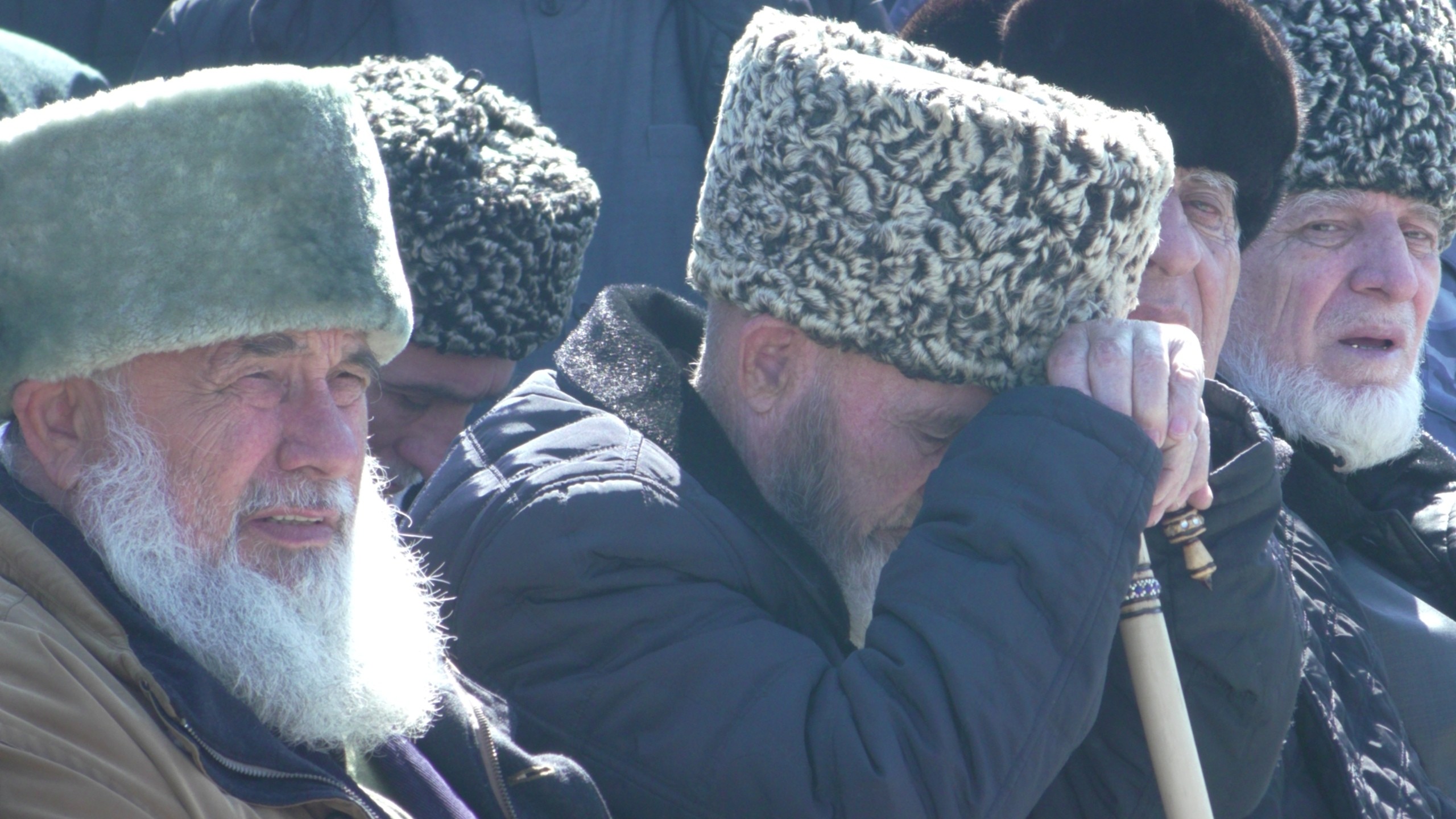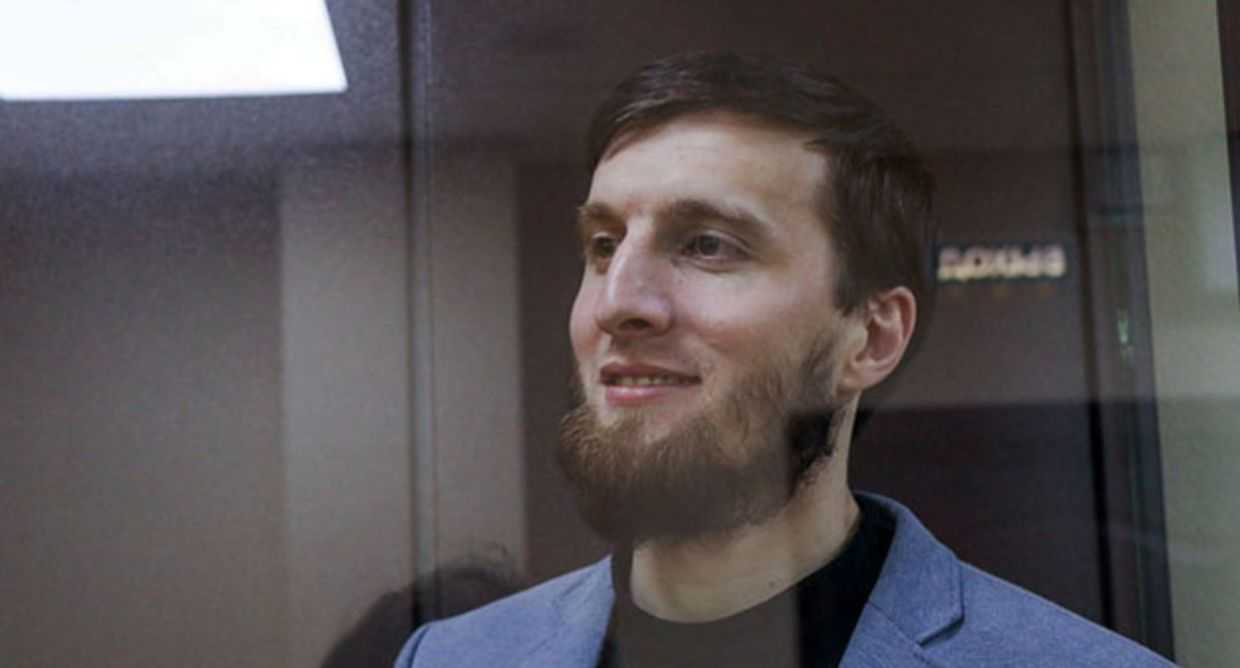

Thousands of protesters have returned to the streets of Ingushetia’s largest city, Nazran, to oppose a land deal with neighbouring Chechnya. The authorities have responded by banning further protests and firing the republic’s interior minister and disbanding a local police unit after reports they sided with protesters against units of the Russian National Guard.
On 31 March, Ismail Nalgiyev, head of Choice of Ingushetia, a rights group opposed to the land deal, posted a picture of a police notice he said he received on Facebook suggesting reports that police were summoning opposition leaders and activists for questioning over the protests were true.
Authorities have since begun an investigation into a group of ‘unidentified individuals’ for incitement to mass unrest and for using violence against a member of law enforcement. According to North Caucasus branch of Russia’s Investigative Committee, ten law enforcement officers sustained injuries during the scuffle.
They also refused to grant permission for protest rallies on 5–9 April in front of the office of state TV channel Ingushetia in Magas, citing a lack of prior notice.
On the night of 28 March, a number of residents of Ingushetia raced cars in groups around in Nazran, the former capital of the republic, signalling and waving Ingush flags Ingushetia in opposition to the controversial border deal.
According to the agreement concluded on 26 September between the heads of Chechnya and Ingushetia, Ingushetia transferred 340 square kilometres (about 9% of its territory) to Chechnya.
Protests have intermittently broken out in opposition to the deal ever since.
During a new wave of demonstrations since 26 March, protesters demanded the resignation of the head of the republic, Yunus-Bek Yevkurov, and denounced the recent attempt to amend the law on referenda.
The changes to the law would have freed the authorities from an obligation to put the deal made with Chechnya, which was ratified by the Ingushetian parliament, to a popular vote.
In October 2018, opponents of the land deal successfully challenged the agreement in the local constitutional court, which decided the process would violate the law on referenda.
Although the federal constitutional court overrode this ruling two months later, the ruling made by the Constitutional Court in Magas became a rallying point for those opposing the deal.
‘By changing the law on referenda, the head of Ingushetia and the parliament will be able to change the borders of the republic without asking the opinion of its people. Our efforts against the deal and the bill defining the border between Ingushetia and Chechnya, in which the republic’s Constitutional Court supported us, will be lost’, Akhmed Barakhoyev, a member of the Ingush National Unity Committee and a member of the Council of Teips told OC Media.
On 20 March, the day after the new referenda law’s first hearing in Ingushetia’s parliament, the National Assembly, Yevkurov ultimately decided to rescind the draft initiative.
This did not prevent further protests, however, which were renewed with a new force on 26 March in Magas, exactly six months after the controversial deal was struck.
The organisers of the protests included the Council of Teips (clans), the Ingush National Unity Committee, the Pillar of Ingushetia movement, rights group Mashr, and the regional branch of Russian opposition party Yabloko.
On 31 March, Akhmed Barakhoyev, co-chair of the Council of Teips, called on supporters ‘to have patience’, saying that if they needed to wait, they would, but that they would eventually get a permit to hold a rally in Magas.
The Ingush National Unity Committee, called on residents that had resisted riot police to go home, saying that the government had promised to sanction another demonstration by 5 April.
Blocked federal motorway
After protests first re-erupted on 26 March, demonstrators refused to disband after 18:00, the time until which the rally was sanctioned by the authorities.
According to the Ingush Interior Ministry, around 2,500 people attended the gathering, a number that the protest leaders disputed.
According to Ingush human rights advocate Magomed Mutsolgov, the rally had around 20,000–30,000 attendants.
Several protest leaders announced the protests would be ‘open-ended’ until Yevkurov resigned, and about 200 people spent the night in front of the TV channel’s office.
The following morning, on 27 March, others rejoined the protest but the gathering was confronted by riot police. Omon, a special police unit within the National Guard, tried to disperse the crowd by force three times, using stun grenades.
Protesters responded by brandishing sticks and throwing stones and chairs at police.
Demonstrators claimed that the authorities jammed mobile connections, a common practice by security forces during street rallies.
Leaders of the Ingush National Unity Committee, one of the groups that organised the protest, intervened and tried to mediate between police and protesters. They called on police to restrain themselves and urged protesters to disperse until 5 April.
Nevertheless, a large group proceeded on foot and in cars to the federal highway leading to Nazran, 10 kilometres north of Magas. According to local news site Fortanga, around 1,000 people then blocked the motorway and entrance into Nazran.
The same day, Yevkurov addressed the crowd on state-run TV, calling for peace and dismissing rumours there were no plans to dissolve the Republic of Ingushetia. He said that there was no possibility of the republic merging with another region, a possibility that some Ingush had expressed concern about since the deal with Chechnya.
Yevkurov’s proposed changes to the Law on Referenda in March would have permitted ‘renaming, splitting, or merging’ Ingushetia with other subjects of the Russian Federation without a popular vote.
Members of the Council of Teips put out a video on their social media channels later that day insisting that the motorway blockade was not their idea and that they did not recognise those who participated. They said they eventually persuaded the protestors to unblock the road into Nazran.
On 29 March, while meeting with the head of the National Security Council of Ingushetia, Yevkurov accused his opponents of radicalising young people and said they might not be able to control these ‘hotheads’ later.
On 28 March, the Security Council called on elders and parents not to let ‘young people’ participate in the rallies.

Son of Nazran city mayor shot
In the evening of 28 March, local residents stormed the City Hall of Nazran and shot Zaurbek Tumgoyev, son of Mayor Alikhan Tumgoyev, with a non-lethal firearm. He sustained only light injuries.
According to Fortanga, the previous day, Nazran’s mayor ‘provoked a brawl’ while talking with protesters blocking the motorway near the Nazran city mosque.
On 29 March, Dmitriy Peskov, spokesperson for President Vladimir Putin, told the media that they were ‘closely following’ the situation in Ingushetia and that it ‘certainly required attention’.
Peskov said there was ‘no reason to connect the shooting in the City Hall of Nazran with the rallies in Ingushetia’.
The city authorities have also denied a connection.
Local police unit dismissed
One witness, who asked to remain anonymous, told OC Media that the riot units that confronted protesters were from the neighbouring regions, and that Ingush law police units ‘stopped their advance’ on protesters using armoured vehicles.
On 29 March, Yevkurov’s former press secretary, Kaloy Akhilgov, wrote on Twitter that the authorities had dismissed 19 officers of the local patrol police ‘over a loss of trust’ after they defended the crowd in Magas on 26 March.
‘There were no casualties among the protesters thanks to this unit, which did not let the National Guard move on them’, Akhilgov said.
The Ingush Interior Ministry confirmed on 1 April to Russian news agency Regnum that they had disbanded the unit, ‘transferring’ its members ‘to other units’ but also firing 17 officers.
On 28 March, the interior ministry put out a statement calling an image spread on social media supposedly showing a local police officer refusing to fulfil his duties during the protests ‘fake’.
During the protests, people in Ingushetia have used mobile applications to mobilise and exchange information about protest locations.
Over last weekend, activists in several group conversations alleged additional law enforcement units were dispatched to Ingushetia and that they were checking door to door, seizing ‘legal weapons’ from everyone.
The National Guard called these reports ‘provocations’; according to them, they were only conducting ‘planned’ checks for overdue permits.
Chechen border talks with Daghestan
Chechen authorities had openly claimed territories in eastern Ingushetia for a number of years, despite a 1993 Chechen–Ingush agreement that left most of Sunzha District within Ingushetia.
The Chechen claims, which refer to Soviet maps from the 1930s, continued even after Ingush President Murat Zyazikov and Chechen President Akhmat-Khadzhi Kadyrov (the father of the current leader, Ramzan Kadyrov) confirmed the existing borders in 2003.
Between 1936–1993, Chechnya and Ingushetia existed as the Chechen–Ingush Autonomous Soviet Socialist Republic and the border between them was not demarcated.
In January, Chechnya also began talks on formalising the border with its eastern neighbour, Daghestan.
[Read on OC Media: Daghestani border communities demand transparency in Chechnya border discussions]
In addition to restoring Daghestan’s Aukh District, a historically ethnic–Chechen district that was abolished after the 1944 deportations, there has been widespread speculation online and in local media that Daghestan’s Botlikh District, which borders Chechnya, would be discussed.
Details of what has been discussed in the meetings so far have not been publicly released.
[Read on OC Media: Controversy over Chechen Aukh District resettlements continues in Daghestan]
A map published on the Chechen parliament’s website on 8 November showed a part of Daghestan within Chechnya.
On the map, the entirety of Lake Kezenoy-Am, located on the border of the Vedeno District of Chechnya and the Botlikh District of Dagestan, and part of the area near the village of Ansalt in the Botlikh District were shown as being a part of Chechnya.
Following the report, the map was taken down and Chechen authorities said it had been a mistake.









